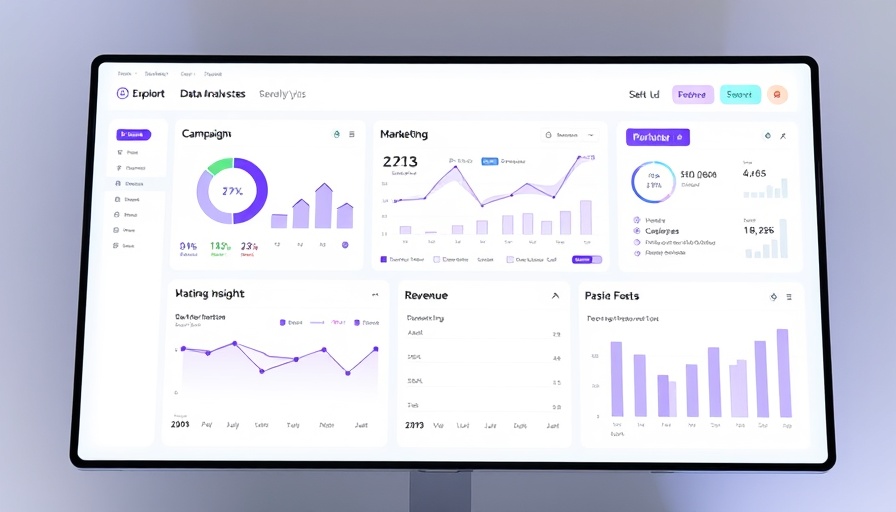
Unlocking Data's Potential: The Rise of Narrative BI
In today's data-driven world, businesses find themselves inundated with vast amounts of information yet struggling to extract meaningful insights. Narrative BI emerges as a beacon of clarity, offering growth teams and marketers a user-friendly, generative business intelligence (BI) platform that transforms complex datasets into actionable insights.
Unlike traditional BI tools, which often require technical skills and involve extensive data manipulation, Narrative BI provides what feels like a personal data analyst at your fingertips. This innovative solution changes the game for marketers, sales teams, and executives who crave clarity without the steep learning curve of data science.
How Narrative BI Simplifies Business Intelligence
Narrative BI's core function is to automate the analysis of marketing, sales, and customer success data, turning raw data into readable narratives. This self-service platform utilizes natural language generation (NLG) to convey insights in plain English. Users no longer have to sift through spreadsheets or dashboards for critical information; instead, they receive concise summaries that articulate what is happening in their data and the implications of those trends.
For example, marketing teams might receive an alert about a sudden spike in website traffic alongside a summary explaining the increase and suggesting strategic next steps. This capability empowers teams to act swiftly, steering marketing campaigns based on real-time insights rather than outdated metrics.
Key Features That Set Narrative BI Apart
Several features elevate Narrative BI beyond conventional analytics platforms, making it a powerful tool for organizations of all sizes:
- Anomaly Detection: Constantly monitoring connected data sources, Narrative BI can alert users to unusual patterns, such as unexpected drops in conversion rates or shifts in ad performance, ensuring teams can pivot quickly.
- Automated Reports: Scheduled updates and real-time notifications can be delivered via email or platforms like Slack, keeping teams in sync without endless dashboard digging.
- LLM-Driven Recommendations: Thanks to large language models, the platform doesn’t just deliver insights but also suggests strategic actions tailored to data context, offering a competitive advantage.
- Seamless Integrations: With robust support for data sources like Google Analytics, Meta Ads, Salesforce, and others, Narrative BI can be seamlessly woven into existing workflows.
Who Can Benefit from Narrative BI?
Narrative BI isn’t just for data-savvy experts; it’s designed for anyone looking to glean insights quickly. This platform is especially beneficial for:
- Agencies: Managing multiple client campaigns can be overwhelming. Narrative BI helps automate reporting, significantly reducing overhead.
- SaaS Companies: These firms can enhance product adoption and customer journeys with focused behavioral analytics, driving engagement and retention.
- Retail and eCommerce Teams: Businesses in these sectors must respond rapidly to fluctuating buyer behavior and optimize advertising spend to stay competitive.
- Enterprises: Large organizations seeking to centralize intelligence across departments will find Narrative BI indispensable for breaking down data silos.
Embracing a New Approach to Data
The potential of Narrative BI extends beyond merely delivering insights; it facilitates a shift in how businesses perceive and utilize their data. By simplifying the interpretation of analytics, teams can focus on strategy and implementation, translating numbers into narratives that foster growth. This paradigm shift enables businesses to combat the weight of analytics fatigue, elevating data utilization to a level where it becomes a transformative asset rather than a burden.
The Future of Business Insights
As the landscape of data continues to evolve, tools like Narrative BI may signify a broader trend toward simplification and accessibility in business intelligence. The future may see an abandonment of complex dashboards in favor of narrative-based insights that drive immediate decision-making and enhance team collaboration.
Business leaders are encouraged to explore Narrative BI's capabilities, especially as the platform continually evolves to integrate more data sources, enhancing its relevance across industries. In a world where speed and clarity are paramount, tools that can convert perplexing data into straightforward narratives will have the advantage.
Take Action and Transform Your Data Strategy
For business owners looking to grow and innovate, now is the time to consider how tools like Narrative BI can reshape your data strategy. Embrace the future of business intelligence by adopting solutions that prioritize usability and clarity, empowering your teams to harness insights for actionable growth.
 Add Row
Add Row  Add
Add 




Write A Comment